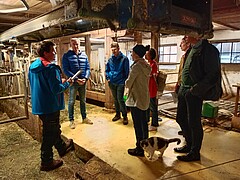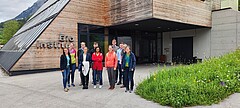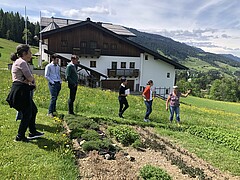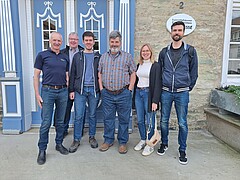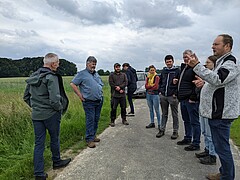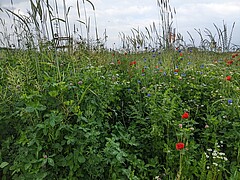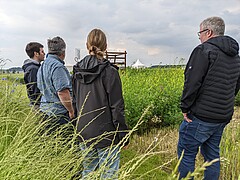i2connect Field Peer Reviews: Successful collaboration to promote innovation [22.07.24]
As part of the i2connect project, two field peer reviews were recently held in which the University of Hohenheim was actively involved. The aim of these reviews is to strengthen the exchange and cooperation between advisors, farmers and scientists in order to promote innovative approaches in agriculture.Field Peer Review in Salzburg, Austria: Knowledge exchange on interactive innovation for Sustainable Mountain Dairy
In May 2024, delegates from the chamber of agriculture of North Rhine-Westphalia, farmer from NRW and i2connect project partner from the university of Hohenheim conducted a peer review of an interactive innovation case in Austria.
The peer reviewed case was based on the experiences of the EIP- Operational Group (OG) project “Mountain Dairy Cattle,” which was conducted from 2019 to 2022. The aim of the EIP –OG project was to document and evaluate innovative husbandry solutions for dairy farms in extreme mountainous areas in Austria.
The delegates from Germany in collaboration with the key EIP-OG project partners in Austria formed a peer review team. Together, they analysed the innovation process of the interactive case using the seven phases of spiral of initiatives. The peer review took place over two full days (May 15-16, 2024) and included farm visits, experimental station visits and in depth discussions with project partners.
Several success factors were identified that accelerated the interactive innovation process. These included: effective task planning and consensus, ability to deliver tangible benefits to farmers, the practical relevance of the project to all partners engaged and having a strong project management team. Key lessons learnt from the review of the innovation process highlighted the importance of open communication, flexibility and recognition and appreciation of compatible knowledge and skill among the many. The full review of the report will be available on the i2connect project website soon.
Biodiversity advisory service for the Hellwegbörde in North Rhine-Westphalia
At the beginning of June, experts on biodiversity advice met in the Hellwegbörde, North Rhine-Westphalia. This event was organised in close cooperation with the NRW Chamber of Agriculture. The international participants included a consultant and a farmer from Ireland, who are also intensively involved in biodiversity-promoting measures, particularly in the field of conservation agriculture.
On the first day, the participants were given a general introduction to agriculture in NRW and the specific tasks of the Chamber of Agriculture and the biodiversity advisory service in the Hellwegbörde. This introduction was supplemented by a guided tour of Haus Düsse, the Chamber's event and training centre. A subsequent tour of Soest rounded off the day.
The second day was dedicated to the Hellwegbörde biodiversity advisory service, an EIP project that ran from 2020 to 2022. The Chamber of Agriculture began by presenting its project-specific results and findings. The results of a master's thesis produced as part of the project were then presented, which analysed the cooperation between farmers and the Biological Station as well as the effects on farmers' understanding of nature conservation. The group, consisting of advisors from the Chamber of Agriculture, the Lower Nature Conservation Authority, the Biological Station, the University of Hohenheim and the Irish peers, then visited two farmers who had taken part in the project. In addition, prepared practical examples were inspected at the DLG field days.
This review focussed in particular on the innovation of the very close cooperation with the Lower Nature Conservation Authority and the Biological Station as well as the intensive support provided to the farmers. This close cooperation and support is a significant innovation that is crucial to the success of the biodiversity advisory service.
On the last day, the Biological Stations gave presentations on their general activities and projects in the area of the Hellwegbörde biodiversity advisory service. The exchange between the participants was extremely productive and all participants returned home with new insights and ideas.
Conclusion
The field peer reviews as part of the i2connect project highlight the importance of international exchange and cooperation in promoting innovation in agriculture. A particular focus was placed on analysing and promoting innovations, such as the intensive cooperation and support of farmers by the Chamber of Agriculture, Lower Nature Conservation Authority and Biological Station in NRW. Stay tuned for upcoming reports on these inspiring and successful events.

